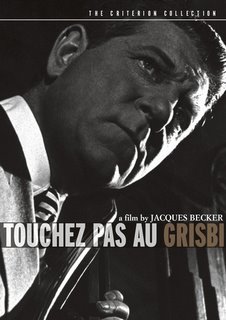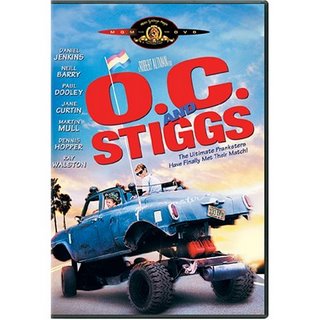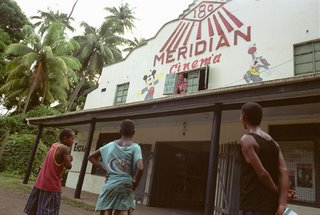 I love magic. I am particularly fond of magicians and escapologists in the early parts of the 20th century. In fact, Harry Houdini is one of my all-time historical figures. I’ve even been to the Houdini museum in Appleton, Wisconsin to further investigate the man and his life (magic geek!). 2006 is a good year for period magic lovers as we get not one but two films set in the early magic world with The Illusionist and then The Prestige following later this year.
I love magic. I am particularly fond of magicians and escapologists in the early parts of the 20th century. In fact, Harry Houdini is one of my all-time historical figures. I’ve even been to the Houdini museum in Appleton, Wisconsin to further investigate the man and his life (magic geek!). 2006 is a good year for period magic lovers as we get not one but two films set in the early magic world with The Illusionist and then The Prestige following later this year.
It’s easy to see why I really enjoyed watching The Illusionist, a romantic drama set in turn of the century Vienna, as all of its elements are things I’m into. First, there is a lot of great magic in the movie, the film delves into the world of spiritualism (another interest that is often connected to magicians during this period) and The Illusionist also has a romantic, mysterious story that reeks of atmosphere thanks to director Neil Burger. Magic, romance and mystery—what’s not to like?
Edward Norton plays the new to Vienna conjuror Eisenheim. Audiences are quickly awestruck by the otherworldly quality of his act and word spreads to the pompous prince Leopold (Rufus Sewell) that here is a magician who might have tricks too complicated for the prince to figure out.
The story develops a romantic triangle when Eisenheim’s teenage love Sophie (Jessica Biel) shows up as the soon-to-be-bride of Leopold and the pair haven’t seen one another in fifteen years. Sophie is drawn to the intense Eisenheim but the pair’s relationship puts them in jeopardy from Leopold and his police inspector (Paul Giamatti) who hounds their every move.
The Illusionist is drenched with period atmosphere thanks to some nice choices by Burger regarding the look of the film. He wisely chooses to create scenes awash in hazy, soft focus images. He uses iris techniques to further give the film a period feel. The atmosphere and look of the film is one of dusk and romance and this adds to the romantic elements already in the film’s story.
The scenes filmed in the darkened, intimate theatres, candles flickering at the front of the stage, as Eisenheim entrances the rapt audiences, were thrilling to watch. It’s some of the best magic scenes I’ve ever seen in a movie—actually, there hasn’t been much in the way of these kinds of scenes over the years. From what I’ve read of the era—these scenes seem very authentic as I watched them.
In a way, I’m an easy mark for this film just based on the magic scenes alone, but luckily, The Illusionist is about more than just Eisenheim doing tricks. There is a lot to enjoy here—the romance and mystery of the story offer as much satisfaction as the terrific look, production design and magic. After seeing The Illusionist and enjoying it so, all I can think is how long before The Prestige comes out?
 Circle this date on your movie going calender: November 3rd. That's the scheduled release date for Borat and one of my most eagerly awaited films of the year.
Circle this date on your movie going calender: November 3rd. That's the scheduled release date for Borat and one of my most eagerly awaited films of the year.
The trailer is hilarious, word of mouth is the film is too. Borat! Borat! Borat!
 Touchez Pas au Grisbi (Hands Off the Loot) is one of my favorite films I’ve seen all year. I’m kind of ashamed I’d never seen it since I love films about heists, criminal behavior and gangsters. What kind of film robot am I to have missed this unbelievably good gem from 1954 and director Jacques Becker? I loved this movie!
Touchez Pas au Grisbi (Hands Off the Loot) is one of my favorite films I’ve seen all year. I’m kind of ashamed I’d never seen it since I love films about heists, criminal behavior and gangsters. What kind of film robot am I to have missed this unbelievably good gem from 1954 and director Jacques Becker? I loved this movie!
Jean Gabin plays Max, a weary, well-respected, aging Parisian gangster who has just pulled off a massive heist of gold with his long-time partner Riton. The pair plan on letting the gold sit for a while but Riton can’t keep his lips shut to his flighty, dancehall girlfriend Josy (played by Jeanne Moreau). Naturally, Josy is two-timing the older Riton and she tells her younger lover (also in the criminal underworld) about the gold and soon Max, Riton and their gold is in serious jeopardy.
Hands Off the Loot is a sheer joy from the very first shot of the film. Becker is in complete control of the film and has crafted a wonderfully understated film about gangsters in Paris. Every shot in the film is composed and thought out—I’m terribly impressed with the level of detail that is packed in the ninety-five minutes the film runs. There is truly not a wasted moment onscreen. Becker lets the story unfold in a patient way that is the hallmark of a great director.
Another thing I loved about Hands Off the Loot is the assured calmness of the performances and the story. Gabin is intense and soft spoken as Max (but he’s not above bare hand slapping some people if he needs to get rough to get some answers in a hurry. One of my favorite scenes has him slapping three different people in about 12 seconds when they don't tell him what he wants to hear.) and by the end you are truly sympathetic to him and his loyalty to Riton. Here is a man who is a gangster, yet he's a gentleman and lives by a moral code even though he makes his living robbing people.
Becker drowns Hands Off the Loot in so many great images and details its impossible to list them. We see nightclubs, on the lam hideouts, restaurants catering to other gangsters, various groups of gangsters holding conversations while discussing future jobs, dark lit streets and stairwells and other classic noir haunts. The film is shot in such a wonderful lustrous black and white that color would have ruined the film. As it stands now, Hands Off the Loot is an ageless story that comes off romantic considering the subject matter, location, the look and the sound of the film.
My favorite kind of gangster films are the ones that make me want to be a gangster—Hands Off the Loot is such a film. I’m really kind of stunned I’d never heard of Hands Off the Loot, as after only watching it once I’m ready to put it into the list of my favorite gangster films of all-time. Hands Off the Loot is that good a movie. Highly, highly recommended.
 A few months ago when the Circle was screening A Prairie Home Companion a few young people in their early 20s/late teens came up to me with the bold claim—“Robert Altman has never made a bad movie!” with all the enthusiasm youth can muster. I’d say to them, “Well, he’s made a lot of movies. None of them were bad?” while thinking of recent duds like Dr. T and the Women and Pret-a-Porter (which was a flaming disaster!). I love Altman as much as anyone but come on, he’s made more than his fair share of failures over his fifty plus years as a director.
A few months ago when the Circle was screening A Prairie Home Companion a few young people in their early 20s/late teens came up to me with the bold claim—“Robert Altman has never made a bad movie!” with all the enthusiasm youth can muster. I’d say to them, “Well, he’s made a lot of movies. None of them were bad?” while thinking of recent duds like Dr. T and the Women and Pret-a-Porter (which was a flaming disaster!). I love Altman as much as anyone but come on, he’s made more than his fair share of failures over his fifty plus years as a director.
Case in point—O.C. and Stiggs from 1985 sees Altman trying to make a ribald teen comedy that satirizes all the ‘80s style teen films from this era. Altman claims to “hate” these teen films on a DVD extra but his satire just doesn’t ring home and comes off as just another zany teen film in the end.
The film is about two oddball teens that are waging a war of revenge against a local Arizona insurance salesman who ripped off O.C.’s grandpa from his retirement fund. The boys pull off a very unbelievable string of stunts to get back at the man and his caroonish family. Very little of this is either funny or entertaining. In fact, both O.C. and Stiggs are mostly annoying!
The boys also go on a trip to Mexico—which is ridiculous as they raft down rivers on tire tubes!—get an absurdly tripped out car (see movie poster), meet up with Vietnam vets who still think they are in a war (Dennis Hopper spoofing his Apocalypse Now performance) and even woo a girl or two. Sounds pretty much like any number of films fitting the ‘80s teen film genre, right?
O.C. and Stiggs isn’t terrible or painful to watch but that doesn’t mean it’s a good film. The film is too confused, the performances are too over the top and silly, it's not funny and it’s too long to be good (or even average). The reason it’s extremely forgettable, while the films that Altman hates aren’t, is those films had a clear direction in story—O.C. and Stiggs is a wildly uneven picture that wants to be a clever satire but comes off as just a poorly conceived film.
I think Robert Altman is one the best living filmmakers making films and all, but he’s not perfect and O.C. and Stiggs is one of Altman’s failures. Those youngsters who came up to me making bold claims just need to make their way to this one and they might rethink their statements. Believe it or not, there are some films in Altman's past that don't work and O.C. and Stiggs is firmly on that list.

 I loved the set up of the 2005 documentary Reel Paradise: a man (John Pierson) who has done a variety of things in the indie film world from producer to TV host (IFC’s Split Screen show) moves to a remote village in Fiji (Taveuni) with his wife and two kids and dedicates a year of his life to showing free movies to the locals at a fifty year old movie theatre called 180 Meridian.
I loved the set up of the 2005 documentary Reel Paradise: a man (John Pierson) who has done a variety of things in the indie film world from producer to TV host (IFC’s Split Screen show) moves to a remote village in Fiji (Taveuni) with his wife and two kids and dedicates a year of his life to showing free movies to the locals at a fifty year old movie theatre called 180 Meridian.
Wow, is that an idea that appeals to me and here’s why. I obviously love movies or I wouldn’t be doing CineRobot. Also, I am drawn to the notion of living in isolated, remote locales and the notion of spreading the sheer joy of the “film experience” to people in such a place just really kick starts my dreamer heart.
The 180 Meridian is a ramshackle structure with torn up seats, windows that go open-air, is powered by a generator and utilizes an old, quirky projector. Every screening is an experience and the theatre is packed most of the films shown over the month the documentary was filmed. I wish filming would have taken place over more than a single month as I would have loved to have seen more movies screened at the 180--as it is they get to see all kinds of films from Jackass to Apocalypse Now Redux.
My favorite part of Reel Paradise was how director Steve James (Hoop Dreams, Stevie) would focus in on the locals as they watched whatever film was being screened. More often than not—the bits of business and broad physical comedies were especially popular—the audience lapped up the images as if they were starving. It’s magical to me to watch the glowing faces of the crowd as they laugh or concentrate on something flickering in the dusty light of a movie theatre in Fiji. They are caught in a 24 frames per second spell. It’s the same spell I’ve been under my entire life.
The film was probably too long and I could have done with a lot of the family drama that was also filmed—rebellious, bratty sixteen-year-old daughter got old real quick. But, if you are like me and love movies and the whole idea of what they represent, Reel Paradise is a charming documentary about a little movie theatre at the far ends of the earth.
 I love magic. I am particularly fond of magicians and escapologists in the early parts of the 20th century. In fact, Harry Houdini is one of my all-time historical figures. I’ve even been to the Houdini museum in Appleton, Wisconsin to further investigate the man and his life (magic geek!). 2006 is a good year for period magic lovers as we get not one but two films set in the early magic world with The Illusionist and then The Prestige following later this year.
I love magic. I am particularly fond of magicians and escapologists in the early parts of the 20th century. In fact, Harry Houdini is one of my all-time historical figures. I’ve even been to the Houdini museum in Appleton, Wisconsin to further investigate the man and his life (magic geek!). 2006 is a good year for period magic lovers as we get not one but two films set in the early magic world with The Illusionist and then The Prestige following later this year.



